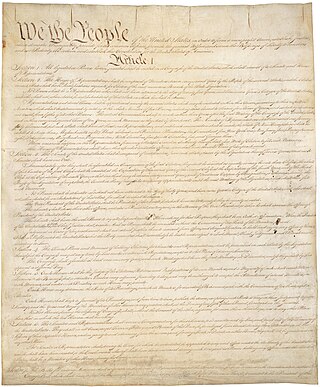Related Research Articles

The Constitution of the United States is the supreme law of the United States of America. It superseded the Articles of Confederation, the nation's first constitution, in 1789. Originally comprising seven articles, it delineates the national frame and constraints of government. The Constitution's first three articles embody the doctrine of the separation of powers, whereby the federal government is divided into three branches: the legislative, consisting of the bicameral Congress ; the executive, consisting of the president and subordinate officers ; and the judicial, consisting of the Supreme Court and other federal courts. Article IV, Article V, and Article VI embody concepts of federalism, describing the rights and responsibilities of state governments, the states in relationship to the federal government, and the shared process of constitutional amendment. Article VII establishes the procedure subsequently used by the 13 states to ratify it. The Constitution of the United States is the oldest and longest-standing written and codified national constitution in force in the world today.

The Thirteenth Amendment to the United States Constitution abolished slavery and involuntary servitude, except as punishment for a crime. The amendment was passed by the Senate on April 8, 1864, by the House of Representatives on January 31, 1865, and ratified by the required 27 of the then 36 states on December 6, 1865, and proclaimed on December 18. It was the first of the three Reconstruction Amendments adopted following the American Civil War.

The Twenty-seventh Amendment to the United States Constitution prohibits any law that increases or decreases the salary of members of Congress from taking effect until after the next election of the House of Representatives has occurred. It is the most recently adopted amendment but was one of the first proposed.
In American political discourse, states' rights are political powers held for the state governments rather than the federal government according to the United States Constitution, reflecting especially the enumerated powers of Congress and the Tenth Amendment. The enumerated powers that are listed in the Constitution include exclusive federal powers, as well as concurrent powers that are shared with the states, and all of those powers are contrasted with the reserved powers—also called states' rights—that only the states possess.

James Andrew Wynn is an American jurist. He serves as a United States circuit judge of the United States Court of Appeals for the Fourth Circuit and formerly served on both the North Carolina Court of Appeals and the North Carolina Supreme Court.
The University of Pennsylvania Law Review, formerly known as the American Law Register, is a law review published by an organization of second and third year J.D. students at the University of Pennsylvania Law School. It is the oldest law journal in the United States, having been published continuously since 1852. Currently, seven issues are published each year with the last issue traditionally featuring papers from symposia held by the review each year. It is one of the four law reviews responsible for publication of the Bluebook. It is one of seven official scholarly journals at the University of Pennsylvania Law School, and was the third most cited law journal in the world in 2006.
Anti-Federalist Papers is the collective name given to the works written by the Founding Fathers who were opposed to or concerned with the merits of the United States Constitution of 1787. Starting on 25 September 1787 and running through the early 1790s, these Anti-Federalists published a series of essays arguing against the ratification of the new Constitution. They argued against the implementation of a stronger federal government without protections on certain rights. The Anti-Federalist papers failed to halt the ratification of the Constitution but they succeeded in influencing the first assembly of the United States Congress to draft the United States Bill of Rights. These works were authored primarily by anonymous contributors using pseudonyms such as "Brutus" and the "Federal Farmer." Unlike the Federalists, the Anti-Federalists created their works as part of an unorganized group.

David Michael Skover is the former Fredric C. Tausend Professor of Law at the Seattle University School of Law. He taught, wrote, and lectured in the fields of federal constitutional law, federal courts, free speech & the internet, and mass communications theory. He is also a regionally acclaimed opera and musical theater singer.

The University of North Carolina School of Law, sometimes referred to as Carolina Law, is the law school of the University of North Carolina at Chapel Hill. Established in 1845, it is among the oldest law schools in the United States and is the oldest law school in North Carolina.
North Carolina Journal of Law & Technology (JOLT) is a semi-annual student publication of the University of North Carolina School of Law. The journal, one of the first of its kind, was founded in 1998 and is viewed as one of the top law and technology journals in the country.
The North Carolina Law Review is a law journal of the University of North Carolina School of Law. It publishes six issues each year as well as its online supplement, the North Carolina Law Review Forum.
Agricultural law, sometimes referred to as Ag Law, deals with such legal issues as agricultural infrastructure, seed, water, fertilizer, pesticide use, agricultural finance, agricultural labour, agricultural marketing, agricultural insurance, farming rights, land tenure and tenancy system and law on Agricultural processing and rural industry. With implementation of modern technologies, issues including credit, intellectual property, trade and commerce related to agricultural products are dealt within the sphere of this law.
A law review or law journal is a scholarly journal or publication that focuses on legal issues. A law review is a type of legal periodical. Law reviews are a source of research, imbedded with analyzed and referenced legal topics; they also provide a scholarly analysis of emerging law concepts from various topics. Law reviews are generated in almost all law bodies/institutions worldwide. However, in recent years, some have claimed that the traditional influence of law reviews is declining.
The Willamette Law Review is a law review academic journal published by Willamette University College of Law in Salem, Oregon, United States. Founded in 1959 as a successor to an earlier publication, the triannual publication is housed in the Oregon Civic Justice Center. The journal is edited by students of the law school with oversight by the college's faculty. As of 2019, the Willamette Law Review has published a total of 55 volumes.
Environmental Law is a law review focused on environmental and natural resources law published by students at the Lewis & Clark Law School. Founded in 1969, it is the oldest law review covering natural resources and environmental law in the United States. The journal is recognized as a national leader in its field and has featured articles by practitioners, academics, legislators, and justices of the United States Supreme Court.
The Mississippi Law Journal is a law review published at the University of Mississippi School of Law. It was established in 1928 by the Mississippi Bar Association and is the state's longest running law review. Originally published with the subtitle Journal of the State Bar Association, the Mississippi Law Journal is now independently published and is funded and operated almost exclusively through the income of its case briefing service, which provides succinct synopses of the decisions of the Mississippi Supreme Court and Mississippi Court of Appeals.

Duke University School of Law is the law school of Duke University, a private research university in Durham, North Carolina. One of Duke's 10 schools and colleges, the School of Law is a constituent academic unit that began in 1868 as the Trinity College School of Law. In 1924, following the renaming of Trinity College to Duke University, the school was renamed Duke University School of Law.
The law of North Carolina consists of several levels, including constitutional, statutory, regulatory, case law, and local law.
Packingham v. North Carolina, 582 U.S. 98 (2017), is a case in which the Supreme Court of the United States held that a North Carolina statute that prohibited registered sex offenders from using social media websites is unconstitutional because it violates the First Amendment to the U.S. Constitution, which protects freedom of speech.

Carolina Review is an independent conservative journal published by undergraduate and graduate students attending the University of North Carolina at Chapel Hill. The Review has been in circulation for nearly 30 years, with the first issue dating back to 1993. The journal prints every month and is composed of original works by student staff writers. It is the only major collegiate publication of its type to have been founded in the early 1990s. Holding to the journal's motto on the cover of recent prints, "Ad Conservandam, Libertatem", the journal is a staunchly conservative and libertarian publication that promotes right-wing politics in their writings.
References
- ↑ "First Amendment Law Review". University of North Carolina School of Law . Retrieved 13 November 2021.
- ↑ "About First Amendment Law Review" . Retrieved 2018-03-06.
